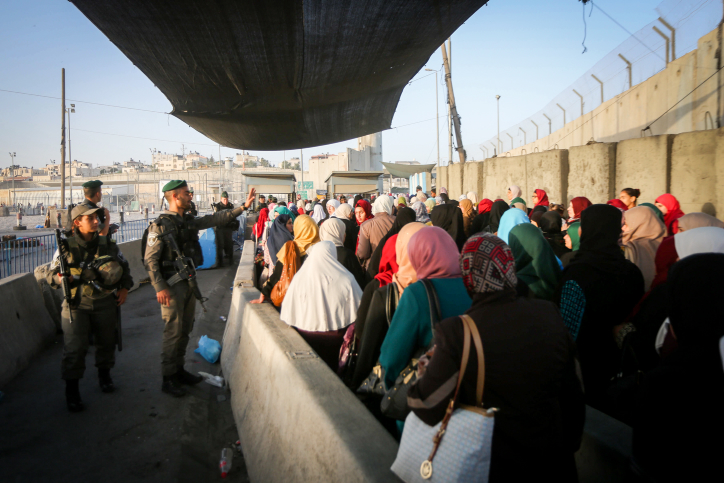The new policy has devastating consequences, not only on family life in the occupied territories, but also for the Palestinian economy.
By Yotam Ben-Hillel

Over the past year and a half, Israel has pursued a policy which aims to keep foreign nationals out of the West Bank. This policy affects everyone: partners of Palestinian residents of the West Bank, parents of children who are West Bank residents, and people who have been working in the occupied territories for many years. It is being implemented by the Civil Administration in the settlement of Beit El, a body that operates under the command of the Israeli military, which is denying extensions of duration for visa holders.
The Civil Administration finds numerous reasons to justify their decision for denial. Working in the territories without a permit is one. In a breach of the Oslo Accords, the Civil Administration refuses to approve work permits for people who are married to a West Bank resident, and have lived in the occupied territories for several decades. The administration probably expects these people not to be able to provide for their family.
In principle, B-1 visas authorize people to live and work in the West Bank. But the Civil Administration does not give those out; instead, it only issues B-2 visas – a visitor’s pass. Foreigners who are married to West Bank residents are also granted tourist status, even if they have lived in the occupied territories for decades. To this day, the Civil Administration is aware that many foreign nationals work in the West Bank anyway, but because it does not have the capacity to issue B-1 visas, no sanctions have been applied. Rather, with its current policy, the administration is forcing foreigner nationals to quit their jobs if they want their visa extension requests approved.
Traveling out of Ben Gurion Airport is another justification used to decline visa extensions for those foreign nationals. Israel restricts their movement to the West Bank only, and those who dare fly through the airport in Tel Aviv are punished for it. Here, too, the procedures violate treaties Israel is a signatory of, and even the protocols of the Civil Administration itself.
The rejection is debilitating in its conciseness: in a single stroke, two words – “request denied” – are jotted down on a little note that is attached to an applicant’s passport. Within seconds, these people become illegal residents of the very place they had lived and worked in for many years, and suddenly face deportation.
If they stay in the West Bank shortly after their status is changed, even if for a mere few days, their designation as “illegal residents” will prevent their ability to return in their future. Those who insist on their right to come back and live in the West Bank will have to brace themselves for a long legal battle, and at times fill the military’s coffers with payments as large as NIS 30,000 and 80,000 — only so that they could qualify again for the three-month visitor’s permit. To clarify: this frequently involves people who are in a relationship with and have children who are West Bank residents.

For many years, foreign partners of West Bank residents were given long-term visas that were renewed on an annual basis. This was a sort of alternative to Israel’s refusal to approve family reunification requests, or provide these partners with a Palestinian identity card. Today, the situation is such that, on one hand, Israel is not granting visas to foreign passport holders who are asking to live in the West Bank, and on the other hand, the Civil Administration is only approving family reunification requests for exceptional humanitarian cases. Entire families find themselves in an impossible situation, where Israel leaves them with one option — to leave.
Aside from Israel’s obvious demographic aspirations (the outrage around predictions of a potential Palestinian majority from the Jordan River to the sea is revealing), and aside from the benefits that Israel reaps by limiting the entry of foreign nationals to the West Bank – after all, they are first-hand witnesses of Israel’s policies there – there is likely another purpose for rejecting extensions.
Preventing foreign nationals — some of whom are not “foreign” at all, but are descendants of West Bank residents who were prohibited from returning — from extending their stay, or barring their entry altogether, sabotages Palestine’s natural development process. It is part of an effort to isolate it from the rest of the world.
One example is the refusal to grant visa extensions for foreign lecturers who work at universities in the West Bank, and the refusal to allow international students from studying there — a policy which severely undermines higher education in Palestine. In that context, it is worth noting that the refusal to issue work visas in the occupied territories discourages foreign investors from visiting the West Bank, which is a double hit for the Palestinian economy.
Approximately tens of thousands of foreign nationals and their family members who are residents of the West Bank are harmed by this policy. However, the issue rarely receives news coverage, both in Israel and the West. Although Israel’s control of the Palestinian population registry and of border crossings is one of the factors that most influences Palestinians lives, it seems that these issues are not shocking enough compared to other mechanisms of the occupation, such as home demolitions, settlement expansion, and the arrest of minors in the middle of the night.
What is especially frustrating is the fact that the countries whose citizens are impacted by this policy completely ignore it.
The Coordinator of Government Activities in the Territories (COGAT), the Israeli military government that oversees the occupation of the West Bank and Gaza, offered the following response:
First, we emphasize that there is no change in the procedure for the entry of foreign nationals to Judea and Samaria, and each individual case is examined on its own merit. Foreigners who are interested in extending their stay in Judea and Samaria must file a request in which they submit paperwork which confirms their status and the purpose of their visit. The case will then be examined by COGAT. The requests can be submitted to the offices of the Palestinian Authority across Judea and Samaria.
We emphasize that COGAT is cooperating extensively with Israel’s Ministry of Interior and Ministry of Foreign Affairs to improve the existing procedure.
Yotam Ben Hillel is a human rights attorney. This article was first published in Hebrew on Local Call. Read it here.
